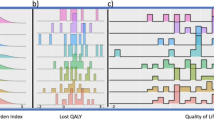Summary
Advanced breast cancer is common and can cause extensive morbidity, often over long periods of time. A variety of treatments, including symptomatic measures, surgery, radiotherapy, endocrine treatment and cytotoxic drugs, may be applicable for individual patients. Cytotoxic chemotherapy is the most contentious therapy because of its potentially severe adverse effects.
While clinical trials give information concerning objective response rates, they are of relatively little value in ascertaining the true value of treatment in routine practice. In recent years, increasing importance has been attached to the evaluation of symptom relief and quality of life. A scoring method for outcome analysis has been developed, in which the resultant of beneficial and adverse effects of treatments is estimated. Sensitivity analysis demonstrated the robustness of this method, which indicated that only about 20% of all patients with advanced breast cancer given first-line chemotherapy gain net benefit. This result was corroborated in a prospective study in which patient reports of benefit were systematically recorded. Most of the expenditure incurred when treating patients with advanced breast cancer is derived from treatment of serious illness rather than from specific antitumour treatment; cytotoxic drug therapy accounts for less than 10% of total expenditure.
Similar content being viewed by others
References
Cancer Research Campaign. Incidence — UK Fact Sheet II 1992
Coleman RE, Rubens RD. The clinical course of bone metastases in breast cancer. Br J Cancer 1987; 55: 61–6
Englesman E, Klijn JCM, Rubens RD, et al. ‘Classical’ CMF versus a three-weekly intravenous CMF schedule in postmenopausal patients with advanced breast cancer. Eur J Cancer 1991; 27: 966–70
Butta A, MacLennan K, Flanders KC, et al. Induction of transforming growth factor beta-1 in human breast cancer in vivo following tamoxifen treatment. Cancer Res 1992; 52: 4261–4
Santen RJ, Santner SJ, Davis B, et al. Aminoglutethimide inhibits extraglandular estrogen production in postmenopausal women with breast carcinoma. J Clin Endocrinol Metab 1978; 47: 1257–65
Spielmann M. Taxol (paclitaxel) in patients with metastatic breast carcinoma who have failed prior chemotherapy: interim results of a multinational study. Oncology 1994; 51: 25–8
Chevallier B, Fumoleau P, Kerbrat P, et al. Docetaxel is a major cytotoxic drug for the treatment of advanced breast cancer: a phase II trial of the Clinical Screening Cooperative Group of the European Organisation for Research and Treatment of Cancer. J Clin Oncol 1995; 13: 314–22
ten Bokkel Huinink WW, Prove AM, Piccart M, et al. A phase II trial with docetaxel (taxotere) in second line treatment with chemotherapy for advanced breast cancer. Ann Oncol 1994; 5: 527–32
Rubens RD. Single agent chemotherapy. In: Powles TJ, Smith IE, editors. Medical management of breast cancer. London: Martin Dunitz Ltd, 1991: 133–7
Steiner R, Stewart JF, Cantwell BMJ, et al. Adriamycin alone or in combination with vincristine in the treatment of advanced breast cancer. Eur J Cancer Clin Oncol 1983; 19: 1553–7
Fischer J, Rose CJ, Rubens RD. Duration of complete response to chemotherapy in advanced breast cancer. Eur J Cancer 1982; 18: 747–54
Gregory WM, Smith P, Richards MA, et al. Chemotherapy for advanced breast cancer: outcome and prognostic factors. Br J Cancer 1993; 68: 988–95
Selby PJ, Robertson B. Measurement of quality of life in patients with cancer. Cancer Surv 1987; 6: 521–43
Rubens RD, Towlson KE, Ramirez AJ, et al. Appropriate chemotherapy for palliating advanced cancer. BMJ 1992; 304: 35–40
Richards MA, Braysher S, Gregory WM, et al. Advanced breast cancer: use of resources and cost implications. Br J Cancer 1993; 67: 856–60
Author information
Authors and Affiliations
Rights and permissions
About this article
Cite this article
Rubens, R.D. Key Issues in the Treatment of Advanced Breast Cancer. Pharmacoeconomics 9 (Suppl 2), 1–7 (1996). https://doi.org/10.2165/00019053-199600092-00003
Published:
Issue Date:
DOI: https://doi.org/10.2165/00019053-199600092-00003




